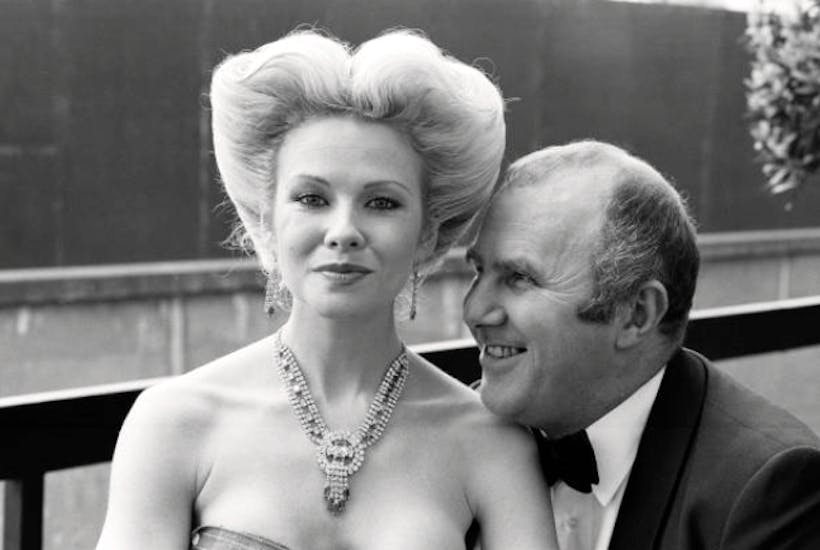One year ago, on November 24, 2019, the great man of letters, comedian, and raconteur, Clive James, died.
I won’t even pretend to be impartial. Ever since I was fourteen, every sentence I’ve ever written has been an attempt to write like Clive James. His command of the language, his ability to balance a sentence, his promiscuous and prodigious consumption of both popular and high culture—all of it I found exhilarating. I was sad to see him go.
The status of “needing no introduction” is one James held for a good three decades, at least in Australia and Britain. I suspect an introduction is now owed, at least to younger readers.
James was a member of that remarkable generation of Australian expatriates—including Germaine Greer, Barry Humphries, and Robert Hughes, who left Australia in the 1950s and 1960s for England. Most were members in some way of the Sydney Push, a group of intellectuals around Sydney University in the 1950s and 1960s. They bore marked similarities to the Bloomsbury Group, but with a distinctive Australian twist. Their guiding philosopher was the great John Anderson, their venues of choice the working–class pubs of Glebe and Newtown, and, if they weren’t reading Proust or discussing T. S. Eliot, they were placing a bet on the Greyhounds. Or sleeping with each other. Argumentative, uncouth, philosophically engaged, and culturally confident. Bohemia with an Australian accent. They went to the UK, not with caps in hand to seek a dose of their cultural inheritance, but fully intending to contribute to it. Another case of one the great themes of twentieth century arts and letters: the empire striking back.
In a recent holiday, I chanced on a copy of May Week Was in June, the third James’ series of Unreliable Memoirs. The first recounts James’s childhood in suburban Sydney. The second (Falling Toward England) his hapless first decade or so as an Australian expatriate in London. And this third volume recounts his years in Cambridge as an undergraduate and, eventually, PhD candidate. (The title is a reference to the May week balls which happen at Cambridge each year, for reasons known only to the English, in June.)
It was every bit as good as I remembered. Here’s a taste:
Insight into his own character: “Like most people who organise their own lives badly, I just love giving advice” (page 37).
Insight into the character of others: “Not everyone who wants to make a film is crazy, but almost everyone who is crazy wants to make a film” (92).
On his prodigious consumption of literature and music: “Having left ordinary self-absorption behind, I was a self trying to absorb all of creation, and must have been as hard to ignore as a vacuum cleaner” (55).
On his writing style: “I try to make every sentence linear, so that the reader never had to look back” (221).
When I first read May Week Was in June, it was a book about Cambridge in the 1960s. On re-reading it twenty years later, it has also become a book about the early 1990s, and what the ‘60s looked like from that vantage point. Occasionally a passage would jolt you into noticing this. Take for example James’s reflection on the status of “high-table homosexuality”:
Cambridge will probably never get around to formally approving homosexuality, but the type of homosexuality involved perhaps prefers a blind eye to public acknowledgement, and meanwhile a tacit understanding seems to provide liberty enough. (62)
If James’ predictions on the acceptance of homosexuality look archaic, his insights into the future of universities look prophetic. Of the Oxbridge education system he says:
Within broad limits you can make as big a fool of yourself as you like, and still be put up with. In that respect, when the ancient universities become efficient, they will cease to be productive. Misfits and failures should have room to flourish. (84)
As managerialism, administrative overreach, and a culture of Occupational Health and Safety to the decimal point continue in our tertiary institutions, it’s hard to imagine this hope continues. Our universities have become more efficient. And less productive.
It so happened I was reading May Week Was in June while protests and riots swept the USA, and the western world. The comparison with the student protest movements of 1960s Cambridge were eery. Describing the 1968 student protests at their height, James says:
A list of Demands was drawn up. A Demand for the complete restructuring of Western civilisation was high on the list. [They called for an] assault on the university’s property, whereupon, it was promised, the repressive nature of the institution would reveal itself…I argued against the notion of making demands that could not be met, and thereby provoking a confrontation…I argued against the proposed defacement of King’s College Chapel, on the grounds that it would dramatize nothing except propensities toward vandalism…There were students in Prague ready to die for the freedoms which in Cambridge were being condemned as illusory. (233)
Clive James, historically left-leaning in the manner of the Sydney Push, was to become a conservative through these protests. The habit of cancelling speakers of alternative viewpoints (a practice alive and kicking in the 1960s), the carte blanche attitude to western culture, and the willingness to destroy property were enough for James to clarify that, whatever he was for, he was against this. Making demands that cannot be met often ends up producing an own-goal.
All the rest suddenly realised that they liked the talking and shouting part of the revolution but didn’t like the part where things got broken and people got hurt. (233)
At the same time, and for the same reasons, the late, great Roger Scruton was becoming a conservative during the student riots in Paris. It will be interesting to see if the protest movements of our day, like those of 1968, exhaust themselves in the same way. And whether the overreach of demands (such as defunding the police) and destruction of property will produce a new generation of conservatives. If it does, we may pray their conservatism is as irenic and thoughtful as James and Scruton’s.
Reading James’ first-hand view of the sexual revolution was sobering and instructive.
In the aftermath I was not always a gentleman. Even more shamefully, I thought I had an innate right to thoughtless behaviour. The Zeitgeist had given my Bacchic urge a blanket endorsement. (86)
Think about that for a moment. Clive James understood the sexual revolution and the second-wave feminism then sweeping the western world to be a “blanket endorsement” of what he euphemistically calls his “Bacchic urge”. The law of unintended consequences being the one iron-law of history.
On the advance in contraceptive technology, James’ says:
The quantum leap in the efficiency and convenience of contraceptive methods amounted to a mandate. Rubber, however elastic, had been to some extent a restraint. Now the wraps were off. If you looked closely enough at the pill, it glowed with green light. (86)
From the perspective of 2020, his understanding of the pill as a “green light” is alarming.
In the book, almost all James’s attempts to seduce or be seduced are comic failures. But one infers that this is for comic effect, and not a representative sample. The “green glow” never dimmed. In 2012 it was revealed that he has been cheating on his wife of 44 years in an eight-year affair with a much younger woman.
In his book Cheap Sex, author Mark Regnerus considered sex in terms of a market. According to Regnerus, in this market men (on average) want more sex and want sex more than women do. Men, in other words, are on the demand side, and women on the supply side. Women have therefore historically been able to demand a high price for sexual access: commitment, responsibility, protection, and the general ability to be an adult. It is a deal commonly called “marriage”. Given what sexual activity means for women in the normal course of events (that is, child-bearing), women were well within their rights to place a very high price on sexual access. And men, on average, benefited by being required to grow up.
Highly effective contraception and pornography have radically cheapened the price of sex in this market. Sex has become much more readily available to men, and without the associated costs of needing to grow up and bear responsibilities. Harvey Weinstein grew up in a world where this unintended “blanket endorsement” of men’s urges was a main-stay of the culture. Harvey Weisteins are a trope of human history. But to be a Weinstein and to be born at such a time as this. Well, what a time to be alive!
Which brings us back to Clive James in the 1960s. Like so many in his generation, he knew a bargain when he saw one. Who knows how many women suffered as a result of his sense that the zeitgeist had bestowed on him a “innate right to thoughtless behaviour”? At least one wife and two daughters. Revolutions have victims. The sexual revolution is not the exception.
Got something to add? Join the discussion and comment below.
Get 10 issues for just $10
Subscribe to The Spectator Australia today for the next 10 magazine issues, plus full online access, for just $10.

























Comments
Don't miss out
Join the conversation with other Spectator Australia readers. Subscribe to leave a comment.
SUBSCRIBEAlready a subscriber? Log in